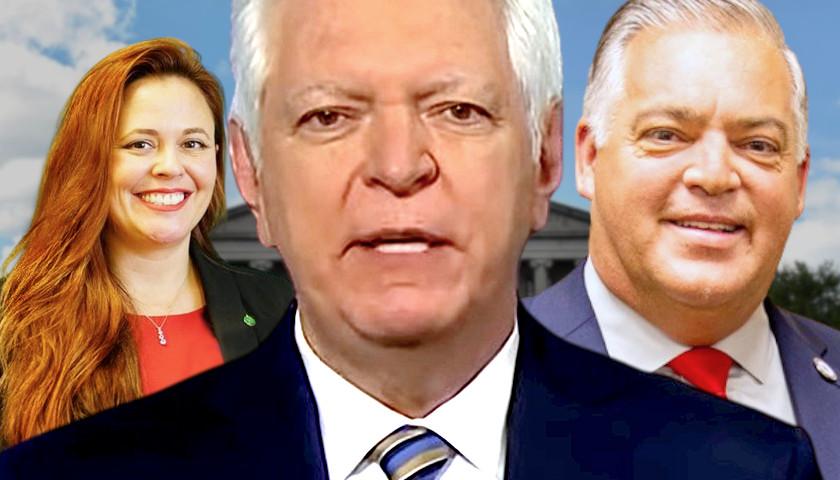Live from Music Row Friday morning on The Tennessee Star Report with Michael Patrick Leahy – broadcast on Nashville’s Talk Radio 98.3 and 1510 WLAC weekdays from 5:00 a.m. to 8:00 a.m. – host Leahy welcomed Tennessee state Senator (R) Mike Bell to the newsmakers line to discuss much-needed Section 230 reform and the momentum created by Trump’s lawsuit against Big Tech.
Leahy: We are joined now on our newsmaker line by State Senator Mike Bell. Good morning, Senator Bell.
Bell: Good morning, Michael. How are you today?
Leahy: I’m great and it’s great to have you on here and talk a little bit about this big tech lawsuit that former President Donald Trump filed on Wednesday.
By the way, our own Laura Baigert was there at Bedminster Golf Club. The Trump National Golf Club there and was present. We had a photographer there.
We did a big story on it and put it out through our Star News Wire Service. It was picked up by a number of outlets around the country.
And Laura got to ask the former president a question, which was there in the press conference. So we are looking upfront and personal at this particular lawsuit. What is your reaction to the lawsuit, Mike?
Bell: Michael, I think it’s probably overdue. This is something that we’ve been talking about in the legislature. Of course, I had an amendment to a bill this last session that was attempting to address this problem, representing Johnny Garrett had it in the House.
And, Michael, we’ve been talking even to the attorney’s general’s office. You may have read yesterday they joined a lawsuit with 37 other states against Google because of the monopoly that they have.
And it’s not just Facebook. It’s not just Twitter, it’s Google. There’s probably a couple of other platforms that would be included that has become a monopoly. And they’ve become an entity that’s controlling speech.
And I don’t think it’s good. We look back in our history when the federal government eventually broke up the old Bell telephone company for somewhat the same reasons because they become a monopoly and control communications. Well, Facebook and Twitter are becoming that now.
As much as it is a free market, small-government conservative, I try to stay away from government regulating business. But when a business does become a monopoly at that point, the government sometimes has to step in.
Leahy: Well yes. Also, the other argument to make here is that the critics of this lawsuit say, well, it’s a privately held company.
It’s not a government entity. Well, my view is exactly the opposite that the protections granted to Google, Facebook, and Twitter under Section 230 of the 1996 Communication Act from liability for false claims, that that protection makes them a government agent.
And that protection has also provided them with the ability to be, in essence, monopolies or oligopolies. So that’s my view. Do you share that?
Bell: I do, Michael. In fact, if the federal government would remove that protection then maybe we would see the market correct itself.
But with that protection still there, as you’ve stated, that’s created a monopoly that’s protected by the government and enforced by the government. And Michael I told, I guess it’s Julie. I can’t remember, too.
Leahy: Our booking producer.
Bell: Yeah. I talked to her yesterday and told her I’ve been dealing with a constituent now for about a week and a half who was permanently blocked from Facebook.
And she is a huge Trump supporter. In fact, she is one of the few people I guess nationwide you look at has actually been brought up on a stage with President Trump at a rally.
He just picked her out of a crowd, and she was brought up on stage with him at a rally early on back in the 2016 campaign. And she just loves President Trump and puts things on social media all the time promoting President Trump.
And she’s been suspended for a period of time, like three days or four days, two or three times, and always being given an explanation by Facebook about why she was suspended.
In other words, she was suspended for putting a certain post up there. But she was permanently banned from Facebook for about a week and a half to go and can’t even get an explanation from Facebook about why she was permanently banned.
A media outlet and that’s what they become, a social media like Facebook can just ban people for any reason and not even give them an explanation.
And it’s become, I guess I’m trying to say, Mike, it’s become an avenue for people to communicate with that’s used by, goodness, I think I read somewhere around 75 percent of Americans have a Facebook account.
Then you’re essentially blocking somebody from being able to communicate. And again, as you said, the protections afforded Facebook and other social media giants through Section 230 just give them way too much power without any consequence.
And so I’m hoping this lawsuit that President Trump is leading will help change that for citizens so they can have some recourse when dealing with these social media giants.
Leahy: Yeah, a very good point. Now, you mentioned that there was a couple of things to talk about at the state level. First, the attorneys general, Herb Slattery, has joined the lawsuit of, I think, 35 other states against Google.
Are you familiar with the lawsuit and what the argument is? Let me just read from our story at The Tennessee Star. Attorney General Herbert Slavery announced on Wednesday that Tennessee will band together with 36 other states in the lawsuit in an attempt to combat what they see as anti-competitive trade practices.
Let me read this quote from Attorney General Slattery and get your reaction. Google’s “play was the long game enticing manufacturers and operators to adopt Android by promising to remain open. Now that the digital doorway is closed, if you want in, you’ve got to do it Google’s way. You essentially have to use its App Store, use its payment processing system, and pay its unreasonable commissions for digital purchases. All of this harms consumers, limits competition, and reduces innovation. Tennessee and 36 other states are no longer on the sidelines.”
What’s your reaction to that lawsuit?
Bell: First, I’m glad General Slattery has chosen to join these other states in the lawsuit. I think he’s exactly right. It has become a monopoly.
You do have to use their platform and their apps in order to access these different means of being able to communicate. I guess, anything from play games to use a map on where to drive to your next appointment.
And Google has grown so much that they control that whole area of the market. Again, from a top-list free-market person, you don’t want the government to step in in these situations.
You hope the market will correct itself. But this has grown to such a point, to use that analogy that I mentioned a few minutes ago, it’s gotten where the Bell company was.
The old phone company got to several decades ago when the federal government had to come in and break them up when they controlled the marketplace of communication.
Google is becoming that and has become that as well as these other social media giants. And I think again, it’s something that we have to be careful about as small government Conservatives to step in.
But it has grown to such a point that I think we got to step in and correct this. Government has to correct it at this point.
Leahy: You talked a little bit about a long bill that you proposed that would limit Big Tech here in Tennessee. Tell us what the status of that bill was and what’s going to happen in the next session of the Tennessee General Assembly when it convenes in January of 2022.
Bell: I think the lawsuit that President Trump is leading and this lawsuit that General Slattery has joined is just going to create more momentum for that.
When we filed the amendment, of course, not to get too much in the weeds, we had Representative Garrett and I had a caption bill that we filed this big amendment that was almost identical to the Florida bill.
You’ve read about the bill that Governor DeSantis had in Florida, and our bill was almost identical to the Florida bill. We filed it, but we filed it kind of late in the session.
And a big bill like that is sometimes hard to get people to be able to wrap their minds around it and to understand it and its impact on it without having a lot of time to look at it.
We had to lay it aside. It’s essentially sitting procedurally on the desk, ready for us to pick it back up and run with it next year.
But I think everything that President Trump is doing with our attorneys general joining the lawsuit will add more momentum for us getting that bill passed.
And what the bill was going to do is it was just going to allow give citizens’ recourse if they felt like they were blocked or wronged by one of these social media giants.
But as you started out talking about this morning, what needs to happen is Section 230 reformed at the federal level and that will open the door because we are at the state level kind of hamstrung in that these giants are, of course, not just multi-state or nationwide, but they’re multinational.
And even if we pass the bill to give set up some type of civil recourse here in the state of Tennessee, it’s going to be kind of tough to enforce on an international, multinational company like Google or Facebook.
But we’re going to try and hopefully, everything that’s happening now will just give us more momentum.
Leahy: Can you hang with us through the break? Because I have some more questions for you, State Senator.
Bell: Sure.
Listen to the full first hour here:
– – –
Tune in weekdays from 5:00 – 8:00 a.m. to the Tennessee Star Report with Michael Patrick Leahy on Talk Radio 98.3 FM WLAC 1510. Listen online at iHeart Radio.




